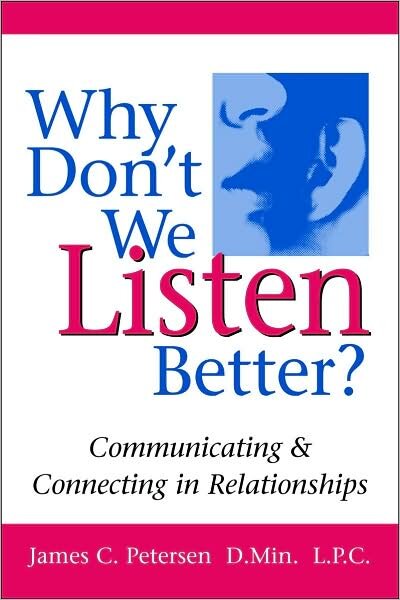James C. Petersen, D. Min., L.P.C. Why Don’t We Listen Better?: Communicating and Connecting in Relationships. Petersen Publications, 2007.
Referenced in: Leadership Development Through Communication Competence
LifeandLeadership.com Summary
This volume, self-published by the author, emerges out of his nearly five decades of experience as a pastor and licensed professional counselor. For those who may discredit it as self-published, do not. It is substantive, deeply reflective of best practices, and very well written.
This text is not targeted to church leaders, but to the human experience in general. The focus is not on every dimension of the communication process, but more specifically on the capacity to listen more effectively in everyday encounters, and then respond from a posture where our brains are fully engaged and our emotions channeled so as to enhance one’s relationships.
By the author’s admission, one of the best ways to read this text is to start with chapter 18, Basic Listening Techniques, and then work through the rest of the book. This practical workbook is designed to be used in short sections, progressing through one skill at a time. It is divided into five major divisions (described on page 8):
- Part One — Exlpains the Flat Brain Theory of Emotions. This shows how difficult it is to communicate well when our emotions are on overload. It actually shows how good listening can often return us to a healthier emotional state. Here one finds some overlap with emotional systems theory.
- Part Two — Discusses the use of the Talker-Listener Card. It facilitates a good taking-turns system of communicating, reminding us to listen first and talk second.
- Part Three — Presents Basic Listening Techniques
- Parts Four and Five — Wraps up the Talker-Listener process with extended examples that deal with group issues and a closing section on learning to become “people in whose presence good things happen.”
Since this text represents a practical version of Petersen’s doctoral dissertation, it incorporates all of the best material one would expect from a guide in effective listening and self-presentation, yet packages it in a very useful format.
From the Publisher
Using a light touch and sensible techniques, Why Don’t We Listen Better? puts the experience of Jim Petersen s forty years of counseling and pastoral ministry at your service in improving your communication and relationships. A Talker-Listener Card process and specific listening techniques for instant use show you how to turn win-lose communication into come-alive cooperation.
About the Author
An experienced seminar and workshop leader, Jim Petersen has developed his own practical techniques for improving communication and relationships. Among them are the Flat-Brain Theory of Emotions and the Talker-Listener Card, key tools featured in Why Don’t We Listen Better? Communicating & Connecting in Relationships. Dr. Petersen s material has benefited corporate clients, city governments, colleges and universities, the hearing-impaired community, students, teachers, parents, couples, and churches. His informal manner endears him to novices and experts alike. In addition to communication work, he teaches courses and workshops in personal growth, informal peer counseling, problem solving, motivation and decision making, conflict resolution, life-planning, couples counseling, Biblical reflection, and discovering meaning through assessing life experiences. He provided pastoral leadership to three Presbyterian churches in Oregon over forty years. He was named Pastor Emeritus at Southminster Presbyterian Church in Beaverton Oregon, honoring his thirty-two year pastorate there. In retirement he maintains a counseling practice as a Licensed Professional Counselor in the state of Oregon. He specializes in counseling couples and teaching classes on effective communication. His degrees include Doctor of Ministry and Master of Divinity from San Francisco Theological Seminary in San Anselmo, California, and a Bachelor of Arts in mathematics from Lewis and Clark College in Portland, Oregon. On a more personal level he is an avid fisherman and plans his next book to be essays on his life-learnings from angling experiences. He plays tennis and a mean game of ping-pong and lives and travels with his writer wife, Sally.
***For additional information on this resource, including reviews, click the bookstore links. Check the reference at page top or the links below for resource guides on related topics.***
Related Areas
See Other Resources on Leadership:
See Other Resources on Leadership Development:
See Resources on Over 100 Ministry Topics:


